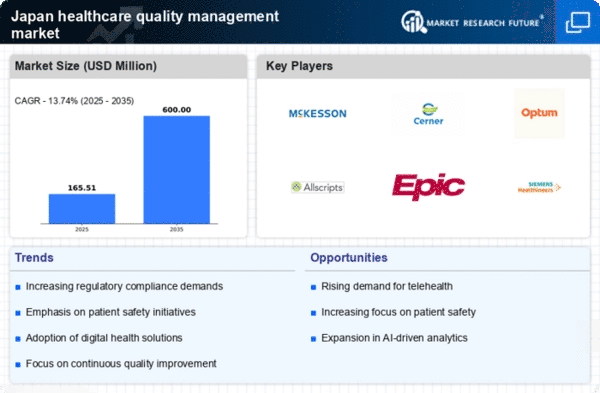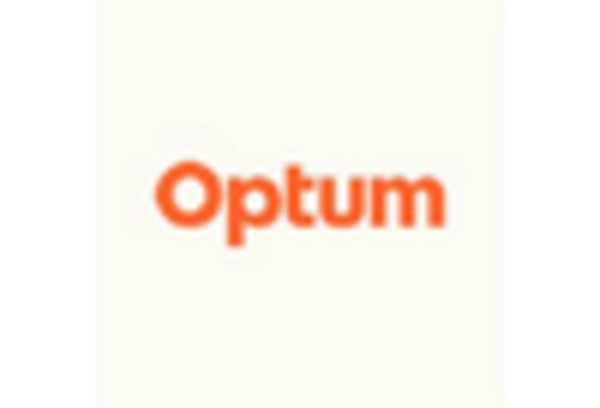Increased Regulatory Scrutiny
In Japan, increased regulatory scrutiny is a significant driver of the healthcare quality-management market. The government has implemented stringent regulations aimed at ensuring high standards of care and patient safety. Compliance with these regulations is essential for healthcare providers to maintain their licenses and avoid penalties. As a result, organizations are compelled to adopt comprehensive quality management systems to meet regulatory requirements. The healthcare quality-management market is likely to benefit from this trend, as providers invest in training, audits, and quality improvement initiatives to align with regulatory expectations. In 2023, approximately 85% of healthcare organizations reported that regulatory compliance was a top priority, indicating a strong focus on quality management as a means to navigate the complex regulatory landscape.
Shift Towards Value-Based Care
The shift towards value-based care is reshaping the healthcare quality-management market in Japan. This model emphasizes the quality of care provided rather than the volume of services rendered. As healthcare costs continue to rise, stakeholders are increasingly advocating for systems that reward providers for delivering high-quality outcomes. In 2023, approximately 60% of healthcare organizations reported transitioning towards value-based care models, which necessitate robust quality management frameworks. This shift encourages providers to focus on patient outcomes, efficiency, and satisfaction, thereby driving innovation in quality management practices. The healthcare quality-management market is expected to expand as organizations adapt to this new paradigm, investing in tools and strategies that align with value-based care principles.
Growing Emphasis on Patient Safety
The growing emphasis on patient safety is a crucial driver of the healthcare quality-management market in Japan. With rising awareness of medical errors and their impact on patient outcomes, healthcare organizations are prioritizing safety initiatives. This focus is reflected in the establishment of safety protocols and quality improvement programs aimed at reducing adverse events. In 2023, surveys indicated that over 75% of healthcare providers in Japan had implemented specific measures to enhance patient safety. This trend not only fosters a culture of safety within organizations but also enhances patient trust and satisfaction. As the healthcare quality-management market evolves, the commitment to patient safety is likely to remain a central theme, influencing investment and operational strategies across the sector.
Technological Advancements in Healthcare
Technological advancements are significantly influencing the healthcare quality-management market in Japan. Innovations such as electronic health records (EHRs), telemedicine, and data analytics are transforming how healthcare providers manage quality. The integration of these technologies allows for better tracking of patient outcomes and more efficient management of healthcare processes. For instance, the adoption of EHRs has been reported to improve clinical decision-making and reduce errors, which is crucial for maintaining high-quality care. In 2023, approximately 70% of healthcare facilities in Japan utilized some form of digital technology for quality management. This trend is expected to continue, as organizations recognize the potential of technology to enhance service delivery and patient safety, thereby driving growth in the healthcare quality-management market.
Rising Demand for Quality Healthcare Services
The increasing demand for quality healthcare services in Japan is a primary driver of the healthcare quality-management market. As the population ages, there is a growing expectation for high standards in medical care. This trend is reflected in the rising healthcare expenditure, which reached approximately 10.9 trillion JPY in 2023. Patients are becoming more informed and are actively seeking healthcare providers that demonstrate a commitment to quality. Consequently, healthcare organizations are investing in quality management systems to enhance patient outcomes and satisfaction. This shift not only improves the overall healthcare experience but also positions organizations competitively within the healthcare quality-management market. As a result, the focus on quality assurance and improvement initiatives is likely to intensify, further propelling market growth.
















